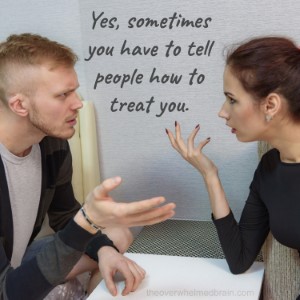If you want a toxic person to change, it will probably never happen. However, there is something you can do to change the course of the relationship that may actually cause them to act differently.
Sometimes you have to make rules that guide toxic people to healthier behavior.
Episode Synopsis
No doubt, toxic people can cause us emotional distress and turmoil. They can be anyone – a friend, a colleague, or even a family member. Dealing with toxic people lies in how we navigate these relationships, especially when the toxic person is someone we can’t easily get away from.
One of the most effective strategies in most difficult relationships is to set clear boundaries. Boundaries are guidelines we establish to define what we will and won’t accept from others. Not only are they essential in maintaining our self-respect, but also in ensuring our emotional well-being.
Consider this scenario: You have a family member who consistently behaves in a way that causes you distress. You might feel obligated to maintain the relationship because they’re family, but their behavior is causing you emotional harm. In such a situation, clear boundaries are more important than ever.
Let them know what is acceptable in your relationship and what isn’t. If they cross the line, it’s on them, not you. You’re not responsible for their behavior or how they feel about your boundaries, but you can control how you respond to them.
If a stranger on the street treated you the way this toxic family member does (using the example above), how would you respond? And would you respond the same way toward family? If not, why not?
I realize setting boundaries is only half the battle. The other half is ensuring that these boundaries are respected. If you establish a boundary and the other person crosses it, then the next step is to apply accountability. If you don’t, they’ll continue to violate your boundaries, making your life miserable.
For example, if you tell someone that you won’t lend them money because you don’t want your relationship to be based on financial transactions, but they continue to ask for money, you might want to say, “I’ve told you I won’t lend you money. If you continue to ask, it will affect our relationship.”
If they still don’t respect that boundary, the accountability might be that you distance yourself from them to protect your emotional well-being.
Setting boundaries can risk the relationship. The other person might get upset or even cut ties with you. But if the relationship is causing you distress anyway, it might be a risk worth taking. Showing them what’s acceptable and what’s not is letting them know how to show up in your life in a healthy, supportive way. Letting them know how you like to be treated is a gift you give to them. After all, people who love you want you to be happy. They want to know how to treat you in a way that makes you happy.
Another crucial aspect of dealing with toxic people is examining your own behavior. Your response to their behaviors can sometimes fuel their toxicity.
When you act kind, humble, or vulnerable, you might think that they would reciprocate. However, some people would rather see you stressed out than happy. It’s practically a goal of theirs to ruin your day! They might not consciously realize they’re doing it.
Therefore, it’s important to be observant about how you respond to a toxic person’s behavior. If you’re always upset or crying when they behave poorly, you might need to reassess your response. Instead of showing them that you’re hurt, show them that you won’t tolerate their behavior. Most toxic people thrive off the response you give them. To them, your responses are predictable.
It takes practice to respond differently. If they insult you, instead of getting upset, you could say, “I don’t appreciate being spoken to in that way. Please speak to me with respect.” By doing something like this, you’re not only setting a boundary but also changing your response to their behavior, which can disrupt their toxic patterns.
Dealing with toxic people can be challenging, especially when they’re close to us. However, by setting clear boundaries, ensuring they’re respected, holding the toxic person accountable, examining our own behavior, and changing our response, we can navigate these relationships more effectively.
Remember, it’s okay to distance yourself from people who consistently drain you of your energy. You deserve relationships that are based on mutual respect and kindness. If a relationship is causing you more harm than good, take a moment to consider what would happen if they never, ever changed. Would you stay in a relationship knowing that person would never change?
Your emotional well-being should always be a priority.
Click the Play button above for the full episode.
Important: If you believe that you may be doing emotionally abusive behavior and would like to change that about yourself, sign up for the life-changing Healed Being program over at healedbeing.com.
If you are in an emotionally abusive relationship, I created the podcast Love and Abuse to help you navigate through the difficulties.
